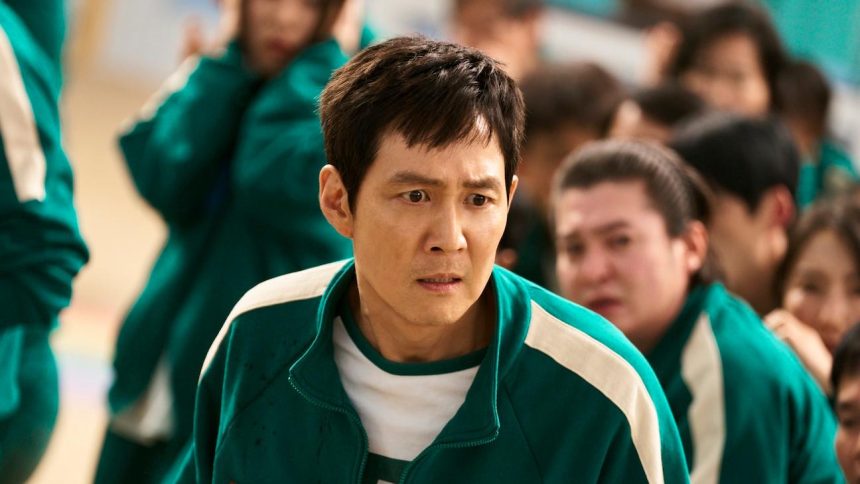Squid Game season 2, while not quite capturing the lightning-in-a-bottle success of the first season, delivers a solid continuation of the high-stakes survival drama, albeit one burdened by filler and the weight of setting up a conclusive third season. The season’s strength lies unequivocally within the games themselves, showcasing a refined character development process that imbues each contestant with compelling motivations, fears, and personalities. This strength is unfortunately offset by extraneous subplots that detract from the central narrative and ultimately make the seven-episode season feel unnecessarily bloated.
The central plot revolves around Seong Gi-hun’s quest to expose and dismantle the clandestine organization behind the deadly games. Having survived the first season’s brutal competition, Gi-hun leverages his winnings to infiltrate the organization, teaming up with Hwang Jun-ho, who is similarly driven by vengeance and a desire to reunite with his brother, the enigmatic Front Man. Their plan, however, goes awry, leaving Gi-hun thrust back into the deadly competition, albeit with a renewed purpose: to bring the games down from within.
The games themselves are a macabre spectacle of tension and psychological warfare, enhanced by the introduction of new challenges and a player voting system that adds an intriguing layer of strategy and betrayal. The diverse cast of characters, ranging from a protective mother and her hapless son to a transgender woman seeking a better life, inject a surprising depth of humanity into the brutal contest, forcing viewers to grapple with the complex moral dilemmas faced by each participant. This investment in character development arguably surpasses the first season, creating a more emotionally resonant experience as players form alliances, betray one another, and ultimately fight for survival.
However, outside the confines of the games, the narrative falters. Jun-ho’s storyline, involving a protracted search for the game island, feels largely inconsequential until the final moments, when the captain of his hired vessel is revealed as a potential double agent. Similarly, the subplot focusing on No-eul, a North Korean defector working as a guard, holds initial promise, exploring the moral conflicts within the organization itself, particularly with regard to a sinister organ harvesting operation. Yet, this thread is abruptly abandoned before the season’s climax, leaving the viewer with a sense of unresolved narrative and wasted potential.
The inclusion of the Front Man, In-ho, as a participant in the games also raises questions. His motivation for inserting himself into the competition remains unclear, mirroring the somewhat baffling decision of the terminally ill old man in the first season. While his eventual betrayal of fellow players and resumption of his Front Man persona creates a dramatic moment, it ultimately feels contrived and lacks a compelling justification within the narrative. Did he participate for the thrill of the game, or was there a deeper strategic purpose? The season finale provides no answers, leaving this plot point dangling for future exploration.
The pacing of the season suffers from the imbalance between the compelling main plot and the underdeveloped subplots. While the games themselves are captivating, the interspersed scenes focusing on Jun-ho’s fruitless search and No-eul’s truncated arc feel like padding, diluting the tension and momentum of the central narrative. This issue is compounded by the relatively short seven-episode length, making the inclusion of these extraneous plotlines even more perplexing. Had the season focused solely on the games and Gi-hun’s struggle within, it could have achieved a greater sense of urgency and impact.
Despite its flaws, Squid Game season 2 manages to maintain a grip on the viewer, largely due to the inherent intrigue of the games and the compelling performances of the ensemble cast. The introduction of new games, the player voting mechanic, and the richly developed characters all contribute to a viewing experience that, while perhaps not as groundbreaking as the original, remains undeniably engaging. The season’s conclusion, however, leaves a lingering sense of incompleteness, suggesting that this second installment is merely a stepping stone to a more conclusive finale in the anticipated third season.
The weaknesses of season 2 ultimately stem from a lack of focus. The core concept, exploring the desperation and moral compromises of individuals pushed to their limits in a deadly game of survival, remains potent. However, by diverting attention to underdeveloped subplots and introducing character motivations that lack clear purpose, the season loses some of the streamlined intensity that made the first season such a global phenomenon. The potential for a truly compelling continuation is evident, but it requires a more disciplined approach to storytelling, prioritizing narrative cohesion and thematic resonance over extraneous plot threads.
The introduction of new games in season 2, while providing a fresh visual spectacle, also raises questions about the internal logic of the competition. While the challenges are visually striking and often ingeniously designed, some feel less organically connected to the overall narrative than those in the first season. The focus on elaborate set pieces, while entertaining, occasionally overshadows the psychological tension that was so effectively employed in the original games. The shift towards more complex, almost theatrical challenges, risks losing the visceral impact of the simpler, childhood-inspired games that initially captivated audiences.
The voting mechanic, however, is a welcome addition, adding a layer of strategic complexity to the proceedings. The ability for players to choose whether to continue or abandon the games after each round creates opportunities for alliances, betrayals, and dramatic shifts in power dynamics. This element injects a new level of uncertainty into the competition, forcing players to consider not only their own survival but also the motivations and potential actions of their fellow contestants. It effectively amplifies the psychological tension, making each decision fraught with consequence.
The character of Gi-hun undergoes a significant transformation in this season, moving from a reluctant participant driven by desperation to a more proactive agent seeking to expose the games’ organizers. This evolution adds a new dimension to his character, providing a more defined sense of purpose and agency. His interactions with the other players, particularly In-ho, reveal a growing awareness of the moral complexities of the situation, forcing him to confront the dark side of human nature in both himself and others.
The ending of season 2 leaves numerous questions unanswered, setting the stage for a potentially explosive final chapter. The fate of Jun-ho, the true motivations of the Front Man, and the ultimate outcome of Gi-hun’s quest for revenge remain uncertain. The concluding scene, with Gi-hun seemingly abandoning his plan to attend his daughter’s hockey game, suggests a renewed commitment to dismantling the organization, setting the stage for a final confrontation between the players and the puppet masters behind the deadly games.
Ultimately, Squid Game season 2 is a mixed bag. It offers glimpses of the brilliance that made the first season a global sensation, particularly in its exploration of character dynamics and the psychological toll of the games. However, it is weighed down by underdeveloped subplots and a slightly less focused narrative. The season serves primarily as a bridge to the anticipated final chapter, leaving viewers with a mixture of intrigue and frustration, eager to see how the complex web of betrayal, revenge, and survival will ultimately unravel.



